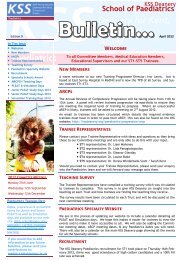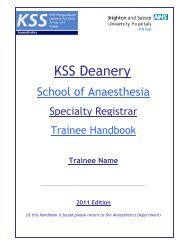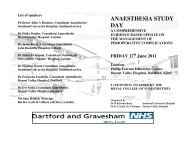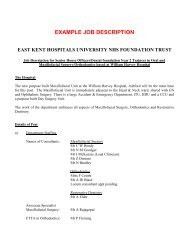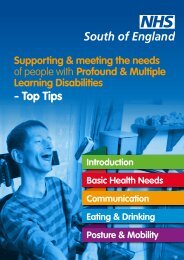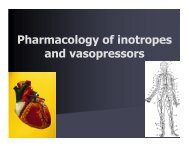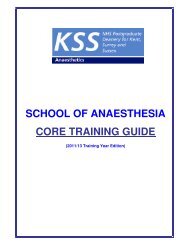The Kent, Surrey & Sussex - KSS Deanery
The Kent, Surrey & Sussex - KSS Deanery
The Kent, Surrey & Sussex - KSS Deanery
Create successful ePaper yourself
Turn your PDF publications into a flip-book with our unique Google optimized e-Paper software.
<strong>The</strong> <strong>Kent</strong>, <strong>Surrey</strong> & <strong>Sussex</strong>School of Clinical RadiologyHandbook 2012/13SCHOOL OF RADIOLOGYHead of School: Camilla SonksenTraining Programme Director: Pippa SkippageTraining Programme Director: Phil ThompsonTelephone: 020 7089 7507Email: Clinicalradiology@kssdeanery.ac.ukWebsite: http://kssdeanery.org/specialty/current-trainees/radiology1
Radiology Trainees’ Guide Content Page1. Welcome and Introduction 32. School of Clinical Radiology2.1 Structure and Programme Management 42.2 Specialty Workforce Team 43. Key Trainee Information3.1 Educational and Clinical Supervision 53.2 e-Portfolio 5-63.3 Assessments and Appraisals 6-73.4 Timeline for trainees 7-83.5 Exams 83.6 Purpose of Annual Review of Competence Progression (ARCP) 9-123.7 ARCP requirements 133.8 Possible Outcomes of ARCP 133.9 Feedback on Posts and Educational Process 143.10 Rotations 144. Policies and Documents4.1 <strong>The</strong> Gold Guide 154.2 Trainee Absences 154.3 Out of Programme 15-165. <strong>The</strong> Support Network Available to You5.1 Support Services for <strong>KSS</strong> <strong>Deanery</strong> Trainees 175.2 Career Support at the <strong>Deanery</strong> 175.3 Library Services 17-186. Useful Websites and Contacts 192
1. WelcomeDear Trainees,Welcome to the <strong>Kent</strong>, <strong>Surrey</strong> and <strong>Sussex</strong> Radiology.We would like you to read this document, which outlines the responsibilities we have to yourtraining, and your responsibilities to ensure that this is progressing well.<strong>Deanery</strong>Trainees are sometimes uncertain about who to contact if they have concerns about variousaspects of their training. To help you direct your queries the following paragraph outlines themain responsibilities of the 3 main bodies involved in Postgraduate Education.<strong>The</strong> <strong>Deanery</strong> is responsible for recruitment of trainees, the annual review of competenceprogression (ARCPs), the allocation of CCT, prospective approval of out-of programmeexperience, the management of the training programmes, the Quality Assurance of training in<strong>Kent</strong>, <strong>Surrey</strong> and <strong>Sussex</strong>, managing trainees that are working less than full time, and managingdoctors in difficulty.<strong>The</strong> Royal College of Radiologists<strong>The</strong> Royal College of Radiologists is responsible for the strategic development of our speciality,national manpower planning, the development and management of the speciality curriculum,establishing training standards, the registration of trainees and determining their projected CCTdates, speciality education initiatives and examinations.Please note that all trainees should register with the College as soon as possible after startingthe Clinical Radiology programme.GMC<strong>The</strong> General Medical Council has a statutory responsibility for the standards of PGME, forinspection of Deaneries & Foundation Schools, for setting standards for trainers & supervisors, forcurriculum approval, the prospective approval of training posts, the prospective approval ofOOPs, managing and analysing the annual trainee and trainer surveys and the final award of theCCT to trainees.We look forward to meeting you and should you need to contact us, please feel free to do so viathe contact details found within this guide.Best wishesSchool of Radiology3
2. School of Clinical Radiology2.1 Structure and Programme Management<strong>The</strong> School of Clinical Radiology is based at the <strong>KSS</strong> <strong>Deanery</strong> Headquarters in London Bridge.<strong>The</strong> School is led by the Head of School, supported by a Locality Programme Director andincludes the College and Faculty Tutors, Educational Supervisors and trainee representation.Head of School – Dr Camilla Sonksen (HoS)Training Programme Director – Pippa SkippageTraining Programme Director – Phil ThompsonCollege Tutor – Iain Morrison (East <strong>Kent</strong>, <strong>Kent</strong> & Canterbury Hospital)Education Lead – Ian FrancisCollege Tutor – Rosie Guy (Conquest Hospital, Hastings)College Tutor – Emma Owens (Eastbourne District Hospital, Eastbourne)College Tutor – Fiona Hearn (Frimley Park Hospital, Camberley)College Tutor – Paul Elton (<strong>Kent</strong> & Canterbury Hospital)College Tutor – Sasha Houghton (Maidstone Hospital)College Tutor – Brendon Conry (Pembury Hospital, Tunbridge Wells)College Tutor – James Crawshaw (Royal <strong>Surrey</strong> County Hospital)College Tutor – Michael Creagh (St Peter’s Hospital, Chertsey)Please see the following link for a list of the college tutorshttp://kssdeanery.org/people/specialty-radiologyCurrent Trainee RepresentativesCharlie Sayer – ST2Rebecca Locke – SPR52.2 Specialty Workforce Team<strong>The</strong> Specialty Workforce Team should be your first port of call with any queries relating to yourtraining within the <strong>Kent</strong> <strong>Surrey</strong> and <strong>Sussex</strong> <strong>Deanery</strong>. You are required to inform the SpecialityWorkforce Team and Trust if there are any changes to your contact details as this will be used aspart of your Form R.<strong>The</strong> School is administered by a Medical Workforce Project Officer, Project Assistant and anAdministrator, see contact details below:Medical Workforce Project Officer (MWPO) – Denise MullingsEmail: DMullings@kssdeanery.ac.uk Tel: 020 7415 3501Medical Workforce Project Assistant (MWPA) – Daniel MargerisonEmail: DMargerison@kssdeanery.ac.uk Tel: 020 7415 3443Medical Workforce Administrator (MWA) – Tara-Sapphire BroeEmail: TSBroe@kssdeanery.ac.uk Tel: 020 7415 35034
3. Key Trainee information3.1 Your educational and clinical supervision• At the start of your training, you will be assigned an educational supervisor and given anaccount for the NHS e-portfolio, which is used to record training and monitor progression.• Educational Supervisor (ES) has a supervisory role and is responsible for overseeing youreducational planning and career development.• It is your responsibility to arrange regular meetings with your ES to ensure your PersonalDevelopment Plan (PDP) and e-portfolio is reviewed. It is recommended that the ESshould spend the equivalent of 1 hour per week per trainee to allow time for educationalsupport through appraisal, assessment, teaching or support, however much of this may beon an informal basis and separate more formal meetings are likely to be less frequent (atleast one meeting per attachment).• As you rotate through each post you will also be supervised clinically by an allocatedclinical supervisor who is responsible for your on-the-job, day-to-day clinical work. Atleast 2 formal meetings with your Clinical Supervisor per attachment are required, aninitial meeting to discuss educational objectives and an end of firm appraisal meeting.• Please understand that completion of your required appraisals, assessments and e-portfolio record is your responsibility and is a mandatory requirement for ARCP.Appraisal = a formative process to enable trainees to develop; a system of cyclical reviewssetting personal objectives and evaluating progress against them. Value is primarily for thetrainee.Assessment = a summative process evaluating performance against predetermined criteria; thevalue is both for the trainee and for regulation.• Ensure you regularly update of your e-portfolio, complete assessments and arrangeappointments with your ES in a timely fashion. <strong>The</strong> more (quality) evidence you have inyour e-portfolio the more likely the time spent with your ES will be productive in terms ofaddressing your PDP and educational planning.• Your ES will seek feedback on performance from clinical supervisors. If you have difficultyidentifying or meeting with your educational supervisor you should approach your CollegeTutor or Training Programme Director.3.2 e-Portfolio<strong>The</strong> online portfolio will be your mainmethod of monitoring and recording yourprogression through training. It is worthensuring that you are registered andbecome familiar with the curriculum andcompetencies as soon as possible.You will be given a username and password – this should only be used by you.• On the e-portfolio ensure all details on your profile are correct, in particular your emailaddress and GMC number.• You must ensure your probity/health and educational agreement declarations are signedoff for each post by yourself and countersigned by your ES.5
• For every post you should have a minimum of 2 appraisals with your clinical supervisor,beginning and end of post, with a further mid-term appraisal being desirable.• Each competency sign off by your educational (and likely to be clinical supervisor withnew e-portfolio) must be supported by evidence. <strong>The</strong>refore you want to ensure your e-portfolio is packed full of evidence and reflects your clinical and other activities.• This evidence will come from workplace-based assessments (WPBA), log entries, audit,teaching attendance, other educational events, your own teaching, conferences, researchetc. In addition, you should complete the self-assessment for each competency andsupport your comments with evidence that you feel is relevant to support any sign off.• You must ensure you do enough WPBAs – there are minimum requirements for each ARCPstage but we would advise you to do more if you can.• You should ensure your WPBA are done by the most senior doctor, preferably aconsultant.• You must have your assessments done by a variety of people.• <strong>The</strong> MSF is very important and one of the most informative tools; you must ensure at least12 respondents for this to be meaningful, ideally 15; at least 4 of the respondents shouldbe consultants. Please ensure the person completing the MSF understands what they aredoing saying yes to probity issues by being careless in completion can have majorimplications.• You should keep a record of your teaching attendance. <strong>The</strong> educational and teachingattendance log should name the teaching session, who it was delivered by and three mainthings you have learnt. This applies to all teaching sessions but also other educationalactivity such as on-line learning.• You should record any absences from work on your e-portfolio – this will be crossreferencedwith medical staffing records. This is further mandated by your sign off ofyour probity and health declarations. <strong>The</strong>refore every time you are absent for reasons ofsickness/compassionate leave etc you must ensure medical staffing are informed for theirrecords.• You should ensure you have a PDP discussed with your educational supervisor, regularlyupdated and added to for changing needs.• Audit is important, audit activity needs to be demonstrated, most importantly evidenceof completion of an audit cycle yearly.• Attainment of FRCR Part 1 by the end of the first year and all the modules of FRCR 2A bythe end of year 3 is recommended. <strong>The</strong> final part 2B can be attempted after completingall modules of the 2A and 30 months of training.• Remember to use the e-portfolio to demonstrate areas of excellence - quality evidenceand quality documentation is important.• <strong>The</strong> annual GMC survey is mandatory and you will need to provide evidence that you havecompleted this.3.3 Assessments and appraisals<strong>The</strong>re will be regular appraisal and assessment during Clinical radiology training which is bothformative and summative. Progress at various points in is dependent on successful assessment.<strong>The</strong> timing and format of appraisal and assessment may vary for each specialty specific module.<strong>The</strong> assessment system is trainee driven and they should liaise closely with theirtrainers/educational supervisors regarding progress through the assessments.Assessments should ideally be supervised by trainers, but may on occasion be delegated to seniortrainees (5).6
Trainees will be assessed in the workplace using a range of assessment tools to be completed bydifferent (sometimes multi-professional) assessors. <strong>The</strong> assessment methods are described belowand will be used in different ways by different specialties. <strong>The</strong> number of forms needed alsovaries by speciality and deanery. While completing the minimum number of assessment forms isone requirement for a successful outcome from the ARCP, it may be necessary to complete manymore assessments in order to show competence throughout the curriculum (sample blank formsare appended within this guide).Mini-Imaging Interpretation Exercise (mini-IPX) - is a structure assessment of an observedradiology interpretation / reporting episode. Trainees should complete a minimum of 6 mini-IPX’s annually.Radiological Directly Observed Procedural Skills (Rad-DOPS) - is a structured assessment of atrainee’s interaction with a patient during a practical procedure. Trainees should complete aminimum of 6 Rad-DOPS annually.Teaching Observation tool evaluates the competence of a trainee to deliver a teaching episodein a wide variety of settings. Trainees should complete at least 1 of these assessments annually.Audit Assessment – is designed to assess a trainee’s competence to complete an audit. <strong>The</strong> AuditAssessment can be based on review of audit documentation or on a presentation of the audit at ameeting. Trainees should complete at least 1 audit assessment annually.Multi-Disciplinary Team Meeting (MDTM) leadership tool – is about to be piloted by the RCR.Multi Source Feedback (MSF) - is a version of the 360 degree assessment. A number ofmultidisciplinary raters anonymously score a trainee against a number of domains mostlyconcerned with attitudes and behaviours.<strong>The</strong> completion of the WPBAs is your responsibility, if no documentation is produced for theARCP it is very likely that you will fail to progress.Who can do your assessments of competency?• Assessors should always be a grade above you (i.e. consultant) - exceptions are whereother professionals supervise aspects of your training e.g. an Advanced Practitioner• Any assessor must have received training in completing WPBAs.• It is expected at least 50% of all assessments are done by a consultant• If this requirement is not satisfied then you may find you have not completed therequired minimum number of assessments.• Please note that for a MSF you must ensure at least 12 respondents for this to bemeaningful, ideally 15; at least 4 of the respondents should be a consultant. Pleaseensure the person completing the MSF understands what they are doing - saying yes toprobity issues by being careless in completion can have major implications.3.4 Timeline for trainees• Training and Induction to Radiology Programme 5 December 2011• 1 st Educational Supervisor report * January 2012/May 2012• 2 nd Educational Supervisor report * June 2012/Nov 2012• ARCP *18 th June 2012/Nov 2012• Summary of Year from Educational Supervisor June 2012/Nov 20127
• Regional Training Days (throughout year) TBC* Trainees starting programmes in August would be expected to attend the June ARCP andhave had 1 st Educational supervisor sign off by January and the 2 nd by June 2012. Traineesstarting programmes in December would be expected to attend the November ARCP and3.5 Exams<strong>The</strong> First FRCR Examination expects candidates to have gained a knowledge of the physicalprinciples that underpin diagnostic medical imaging and of the anatomy needed to perform andinterpret radiological studies.Applicants need to hold a formal clinical radiology training post, in which they are activelyreceiving clinical radiology training, (or to have held such a post in the past) in order to enterthe First FRCR Examination. <strong>The</strong> examination is held three times a year. <strong>The</strong> First FRCRExamination comprises two modules: physics and radiological anatomy. All candidates will needto pass both modules in order to pass the examination overall.<strong>The</strong> Final FRCR Examination in Clinical Radiology is in two parts: Part A and Part B. In both partsof the Final Examination for the Fellowship, candidates will be examined on all aspects ofclinical radiology in the curriculum. Both examinations are held twice a year: Part A is normallyheld in the third or fourth week of each of March and September and Part B in the second orthird week of each of April and October.Exam datesBelow are the exam dates and the full exam timetable, fees and application window is availableon <strong>The</strong> Royal College of Radiologists website:Module 1: PhysicsDate of ExaminationMonday 5 th March 2012Monday 11 th June 2012Monday 10 th September 2012Publication of ResultsTBCTBCTBCModule 2: AnatomyDate of ExaminationPublication of Results6 th – 7 th March 2012 TBC12 th – 13 th June 2012 TBC11 th – 12 th September 2012 TBCFinal: Part A• Chest &12 th March 2012 17 th September 2012Cardiovascular• Musculoskeletal 12 th March 2012 17 th September 2012• Gastro-intestinal 13 th March 2012 18 th September 2012• Genito-urinary 13 th March 2012 18 th September 2012• Paediatrics 14 th March 2012 19 th September 2012• Neuroradiology 14 th March 2012 19 th September 2012Final: Part BDate of ExaminationPublication of Results26 th – 30 th March 2012 TBC1 st – 5 th October 2012 TBC8
3.6 Annual Review of Competence Progression (ARCP)<strong>The</strong> Annual Review of Competence Progression (ARCP) replaces the old ‘RITA’ process and is amechanism of recording the review of a trainee’s progression through their training programme.<strong>The</strong> process is two-way and is also an opportunity for the Training Programme Director toestablish whether a trainee’s requirements are being met.<strong>The</strong> purpose of an ARCP is to:• Review training to date, particularly since the previous ARCP,• Ensure that the future training will be of maximum benefit,• Identify any deficits in knowledge and skills,• Ensure that all requirements can be satisfied before completion of training programme,• Know that career plans are realistic.Within <strong>KSS</strong>, our aim is for doctors and dentists in training to be safe, to develop the habits of‘lifelong’ learning and to achieve appropriate standards of practice. By regulating the progress ofdoctors in training, the ARCP process protects patients and directs the training process.<strong>The</strong> ARCP panel is usually made up of:• PG Dean/Head of School/Training Programme Director• Training Programme Director/Associate Postgraduate Dean• External Trainer• 2 Academic Representatives*• Military Representative*• Lay Chair*this is only relevant if you are an academic/military trainee.9
ARCP Decision Aid<strong>The</strong> decision aid grids offer guidance on the domains to be reviewed and level of attainmentssuggested to inform an ARCP panel.Standards of Satisfactory Progression (Outcome 1)Curriculumcoverage:GenericST1 ST2 ST3 ST4 ST520-30% focusarea contentat core leveldescriptor50% focusarea contentat core leveldescriptorCompetent inall focus areacontent atcore leveldescriptor50% focusareas contentat Level 1/2descriptorsCompetent inall focus areacontent atLevel 1/2descriptorsCurriculumcoverage:RadiologySpecific20-30%commonpresentationsat core leveldescriptor60% commonpresentationsat core leveldescriptor90% commonpresentationsat core leveldescriptorCompletecommonpresentationsL1 - Specialinterest area(s)L2 - Specialinterest area/ multiple L1interestareasIndicativeWorkplacebasedAssessments / yr6 mini-IPX (minimum of 2 per clinical attachment), 6 Rad-DOPS (minimum 2 perclinical attachment), 1 MSF, 1 Audit Assessment, 2 Teaching ObservationsWpBA should be undertaken in a timely and educationally appropriate mannerthroughout the training yearProgression predicted by satisfactory anchor statementsExaminationsFirst FRCRExaminationFinal FRCRPart AExamination:three modulesFinal FRCRPart AExamination:all six modulesFinal FRCRPart BExamination-EducationSupervisor'sStructuredReportAll areas of personal and professional development addressed with overallprogress at expectation or above10
Standards for Unsatisfactory Progression – No additional Training Time Required (Outcome 2)Curriculumcoverage:GenericCurriculumcoverage:RadiologySpecificIndicativeWorkplacebasedAssessments /yrExaminationsEducationSupervisor'sStructuredReportST1 ST2 ST3 ST4 ST5
Standards for Unsatisfactory Progression – Additional Training Time Required (Outcome 3)Curriculumcoverage:GenericST1 ST2 ST3 ST4 ST5
3.7 ARCP requirementsRadiology trainee:<strong>The</strong> RCR recommends that repetition of the entire year should only berecommended for exceptional reasons.• Form R• Educational Supervisor’s Report• College Registration/ Membership• Work Place Based Assessments:Annual WBPA minimum requirementAudit Assessment – 1Teaching Observation - 1Rad-DOPS - 6Mini-IPX - 6MSF 1 per year – 12 assessors needed<strong>The</strong> Assessment forms can be found via <strong>The</strong> Royal College of Radiologists website.• <strong>The</strong> suggested number of films to be completed by trainees per week are:ST1 ST2 ST3 ST4 ST5Plain Film 50 75 100 100+ 100+• Evidence of audit and research (and possible publications)• End of year report from Educational Supervisor• Letters of commendation/complaint• Initial and Exit appraisals per post• Proof of completion GMC survey• Completion of a logbook, found on the e-portfolio• Completed the Clinical Leadership Online Survey MonkeyIf teaching is failing to occur, or is of inappropriate quality, trainees should approach their localcollege tutor and subsequently the programme director, failing unsuccessful local resolution.3.8 Possible outcomes of ARCPOutcome 1Outcome 2Outcome 3Outcome 4Outcome 5Outcome 6Outcome 7Outcome 8Outcome 9Achieving progress and the development of competences at the expected rateDevelopment of specific competences required – additional training time not requiredInadequate progress by the trainee – additional training time requiredReleased from training programme with or without specified competencesIncomplete evidence presented – additional training time may be requiredGained all required competences; will be recommended as having completed the trainingprogramme and for award of a CCT or CESR/CEGPROutcome for LATs and Fixed-term Specialty Trainee (FTSTAs):Outcome 7.1 - Satisfactory progress in or completion of the LAT / FTSTA placement.Outcome 7.2 - Development of Specific Competences Required – additional training time notrequiredOutcome 7.3 - Inadequate Progress by the TraineeOutcome 7.4 - Incomplete Evidence PresentedOut of programme for research, approved clinical training or career break(OOPR/OOPT/OOPC)Outcome for doctors undertaking top-up training in a training post13
3.9 Feedback on Posts and Educational ProcessYou will be asked to complete as mandatory the Annual GMC trainee surveyand need to provide evidence of completion as part of your ARCP.3.10 Rotations<strong>The</strong> first 4 months of training will be designed to familiarise the traineewith the workings of the department. Clinical experience and teachingwill focus on allowing the StR to prepare for the part 1 FRCR in March.After the initial 4 month induction period the trainee will commence a series of modular systembased firms designed to cover the core curriculum.Trainees will spend the duration of their core training within <strong>Kent</strong>, <strong>Surrey</strong> or <strong>Sussex</strong> but therewill be the opportunity to access post in London and <strong>KSS</strong> for subspecialty experience in years 4 &5.14
4. Policies and Documents4.1 <strong>The</strong> Gold Guide<strong>The</strong> Gold Guide is published with revisions each year and you need to refer to the Gold Guide forthe year you were recruited into training. This version will remain relevant for the length ofyour training within <strong>KSS</strong>.<strong>The</strong> Gold Guide provides overarching guidance and standards as to the arrangements forSpecialty Training in the UK.Refer to the Gold Guide together with <strong>Deanery</strong> guidance for standards relating to:• <strong>The</strong> role of statutory bodies• Supervision• LAT and LAS• Less Than Full Time Training, Maternity Leave, OOP• Deferral• Appraisal, assessment and annual planning4.2 Trainee absences• Please note that you must be aware of each trust’s process on who to notify when absent,in particular for any unplanned absence (i.e. other than annual, professional or studyleave)• You must enter all unplanned absences on your e-portfolio record and ensure youreducational supervisor is aware of any unplanned absences• Unplanned absences are taken very seriously by the Trusts and the <strong>Deanery</strong>.• Any recurrent unplanned absences, particularly from night or weekend shifts will bereviewed• If you have more than one unplanned absence from work this will be reviewed with you byyour educational supervisor and/or college tutor.• For repeated unplanned absence you may be referred to Occupational Health, forcounselling, to the Careers Development Unit or for disciplinary procedures.4.3 Time Out of Programme (OOP) during Core TrainingOut of programme for research, approved clinical training or a career break(OOPR/OOPT/OOPC). All out of programme experience is at the discretion of the Head ofCommittee and Training Programme Director. <strong>The</strong> GMC and the <strong>Deanery</strong> discourage this in all butexceptional cases (e.g. a once and only opportunity to undertake a much sought afterfellowship). Trainees need to get the permission of the <strong>Deanery</strong> at an early stage in planning; therelevant forms need to be completed early. <strong>The</strong>re should be no direct approaches to the JRCPTB.<strong>The</strong> <strong>Deanery</strong> is the relevant authority in deciding whether or not to grant OOP (Gold Guidereference (6.69)). Cover arrangements need to be in place for the OOP trainee before anyrequest for OOP can be considered.Types of OOP<strong>The</strong>re are four types of OOP which may be considered, the details of which are explained later inthis document:• OOPT – Out of Programme for Approved Clinical Training15
This is where a trainee is undertaking GMC prospectively approved clinical training whichis not part of the trainee’s specialty training programme.• OOPE – Out of Programme for Clinical ExperienceWhere a trainee is gaining clinical experience which is not approved by GMC but whichmay benefit the doctor or help support the health needs of other countries.• OOPR – Out of Programme for ResearchWhere a trainee is undertaking a period of research.• OOPC – Out of Programme for Career BreakWhere a trainee is taking a planned career break from the specialty training programme.NoticeTrainees should give their Postgraduate Dean as well as current and next employers a minimumof six months’ notice, but preferably as much as possible. This is to ensure that service issuesand the needs of patients can be properly addressed. In exceptional circumstances notice ofthree months may be acceptable.16
5. <strong>The</strong> Support Network Available to You5.1 Support Services for <strong>KSS</strong> <strong>Deanery</strong> Trainees<strong>KSS</strong> <strong>Deanery</strong> is committed to ensuring the welfare of its trainees, and wants to ensure that alltrainees studying with the <strong>Deanery</strong> have the best possible chance of success during their training.We maintain and run a number of programmes and services which aim to ensure trainees aresupported at all stages.• Less Than Full-Time Training• Maternity Leave• Out-of-programme• Deferring the start of specialty training• Study leave• Support for trainees in difficulty• Inter-<strong>Deanery</strong> transfersFurther information on each of these is available from the Specialty Workforce Team.5.2 Careers Support at the <strong>Deanery</strong>Who to contact at the <strong>Deanery</strong>• Joan Reid – Head of Careers• Jason Yarrow – Senior Careers Adviser• Lisa Stone – Careers Adviser• All based at the <strong>KSS</strong> <strong>Deanery</strong>What the Careers team do:• Careers – 3 tiers of support• Referrals – trainee in difficulty guide• 4 stage model – career planning• Faculty development – career support workshops and PG cert Managing Medical Careers• Information evenings and support career fairs• ROADS – career planning book• <strong>KSS</strong> careers website• Medical careers website – www.medicalcareers.nhs.uk5.3 Library ServicesLibrary and knowledge services form part of the <strong>KSS</strong> <strong>Deanery</strong>, known as LKSDT. <strong>The</strong>y manage acollaborative network of NHS libraries, offering a variety of services that support evidence-basedpractice, and the skills to use them.http://kssdeanery.org/education/lksYOU CAN:• Search a wide range of regional resources, including:o Books17
o Journalso Local and linked libraries• Sign up for an Athens account and gain access to:o Databaseso eBookso Specialist Librarieso Current awareness services18
6. Useful Websites and Contacts<strong>KSS</strong> Postgraduate <strong>Deanery</strong>Radiology Specialty Workforce Team5 th Floor, Alpha House100 Borough High StreetLondonSE1 1LBEducational supervisorClinical supervisorHead of Radiology Committeeclinicalradiology@kssdeanery.ac.ukTraining Programme DirectorPhilippa.skippage@fph-tr.nhs.ukLocality Programme Directorphil.thompson@bsuh.nhs.ukIain Morrisoniain.morrison@ekht.nhs.ukIan Francisian.francis@bsuh.nhs.ukRosie Guyrosie.guy@esht.nhs.ukEmma Owensemma.owens@esht.nhs.ukFiona Hearnfiona.hearn@fph-tr.nhs.ukPaul Eltonpaul.elton@ekht.nhs.ukSasha Houghtonsashah@doctors.org.ukBrendon ConryB.conry@nhs.netJames Crawshawjames.crawshaw@nhs.netMichael Creaghmichael.creagh@asph.nhs.ukMedical Workforce Officer: Kevin Hand Clinicalradiology@kssdeanery.ac.ukMedical Workforce Assistant: Bassey Udaw Clinicalradiology@kssdeanery.ac.ukMedical Workforce Administrator: Maame Osei-Kyeremeh Clinicalradiology@kssdeanery.ac.ukTrainee Representative: Charlie Sayer charliesayer@doctors.org.ukLess Than Full-Time Training rep: Rebecca Locke rebecca.locke@bsuh.nhs.ukUseful addresses and websites• Royal College of Radiologists - www.rcr.ac.uk• e-Portfolio - https://www.nhseportfolios.org• Society of Radiologists in Training (SRT) - www.thesrt.org.uk• RITI Radiology Integrated Training initiative - www.e-lfh.org.uk/projects/radiology/index.html• Aunt Minnie Imaging resource - www.auntminnie.com• NICE - www.nice.org.uk19



